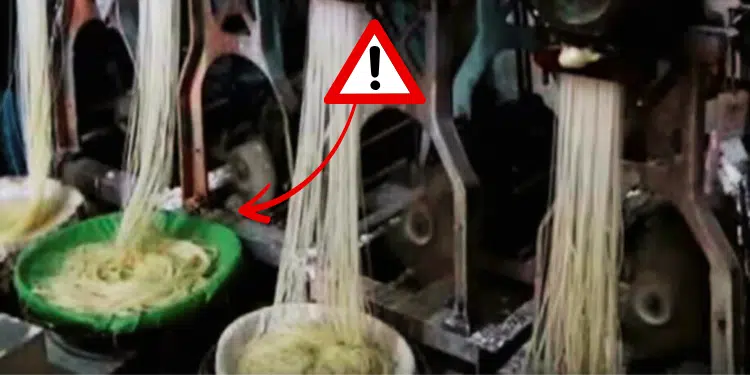China is a leading global exporter of food, but some of its products have raised serious health concerns over the years.
Reports of contamination, questionable ingredients, and poor regulation have put certain foods under scrutiny.
Some of these products may be tainted with pesticides, plastic, or even cancer-causing chemicals, making it crucial for consumers to be informed.
Here are 10 questionable foods from China that you might want to think twice about before consuming.
1. Plastic Rice
- What It Is: Fake rice made from a combination of potato, sweet potato, and plastic resin.
- Why It’s Dangerous: Consuming plastic can lead to digestive issues and long-term health problems.
- How to Avoid: Stick to trusted brands and avoid suspiciously cheap rice.
2. Pesticide-Laden Apples
- What It Is: Apples from China are often treated with excessive pesticides to keep them looking fresh.
- Why It’s Dangerous: Pesticide residues can increase the risk of hormonal imbalances and cancer.
- How to Avoid: Wash apples thoroughly or buy organic, locally sourced apples.
3. Tilapia Fish
- What It Is: Tilapia is a popular, low-cost fish often farmed in polluted waters in China.
- Why It’s Dangerous: These fish are raised in contaminated water and fed questionable substances, leading to high levels of toxins in the meat.
- How to Avoid: Choose wild-caught fish from trusted sources instead of farmed tilapia.
4. Chicken
- What It Is: Chicken imported from China has been flagged for poor hygiene and excessive antibiotic use.
- Why It’s Dangerous: Consuming chicken with high antibiotic levels can contribute to antibiotic resistance and other health issues.
- How to Avoid: Buy locally raised, antibiotic-free chicken whenever possible.
5. Fake Green Peas
- What It Is: Counterfeit peas made from soybeans, green dye, and sodium metabisulfite, a chemical that can cause cancer when consumed in high quantities.
- Why It’s Dangerous: These peas don’t decompose naturally and can harm the digestive system.
- How to Avoid: Look for peas that don’t have an unnatural sheen or overly bright green color.
6. Processed Mushrooms
- What It Is: Canned or processed mushrooms imported from China often contain high levels of preservatives and artificial chemicals.
- Why It’s Dangerous: Overexposure to these chemicals can lead to toxic buildup in the body.
- How to Avoid: Opt for fresh, locally grown mushrooms.
7. Garlic
- What It Is: Garlic from China is often bleached to give it a whiter, more uniform appearance.
- Why It’s Dangerous: The bleaching process involves chemicals that can be harmful when ingested.
- How to Avoid: Choose organic garlic or buy from local farmers.
8. Salt
- What It Is: Some industrial salt from China is sold as table salt. It contains toxic chemicals like heavy metals.
- Why It’s Dangerous: Long-term consumption of contaminated salt can lead to severe health problems, including kidney and liver damage.
- How to Avoid: Buy salt labeled as food-grade and produced by reputable brands.
9. Shrimp
- What It Is: Shrimp farmed in China is often treated with antibiotics, pesticides, and disinfectants to prevent disease in overcrowded farms.
- Why It’s Dangerous: These substances can remain in the shrimp and pose health risks to consumers.
- How to Avoid: Purchase wild-caught shrimp or look for certifications like MSC or ASC.
10. Baby Formula
- What It Is: Some baby formulas produced in China have been found to contain melamine, a chemical used in plastics.
- Why It’s Dangerous: Melamine can cause kidney damage and has been linked to several cases of infant illness and death.
- How to Avoid: Choose baby formula from trusted international brands with strict quality controls.
How to Protect Yourself
- Buy Local: Choose locally grown or produced foods whenever possible.
- Check Labels: Look for clear labeling of the product’s origin. Avoid foods with vague or missing information.
- Opt for Organic: Organic certification ensures stricter regulations and reduced exposure to harmful chemicals.
- Wash Thoroughly: Washing fruits and vegetables can help remove pesticide residues. Soaking in a vinegar solution is even more effective.
- Stay Informed: Stay updated on food recalls and reports from trusted sources.
While not all foods from China are dangerous, the lack of stringent food safety regulations has raised legitimate concerns about certain products.
By being mindful of the origin of your food and choosing trusted sources, you can reduce your exposure to harmful substances and protect your health.
Share this article to help others stay informed about the potential risks of questionable foods and how to make safer choices for their families.

